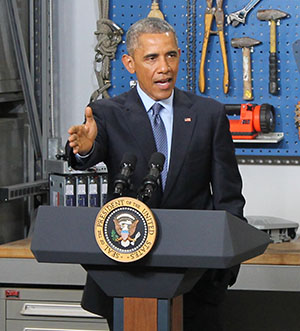
CEDAR FALLS—Touting the success of the high-speed broadband service provided by Cedar Falls Utilities, President Barack Obama introduced his plan to improve Internet quality throughout the country during a Jan. 14 stop.
Speaking to a private group of 200 invitees at CFU’s headquarters, President Obama gave a glimpse of what he will propose during his Jan. 20 State of the Union address.
“Today, high-speed broadband is not a luxury, it’s a necessity,” the president said. “This isn’t just about making it easier to stream Netflix or scroll through your Facebook newsfeed… this is about helping local businesses grow and prosper and compete in a global economy.”
CFU’s broadband service is something of a trailblazer in the state, dating back more than 20 years ago when the Internet was still a novelty.
“In the 1990s not many people understood how important the Internet would be,” Betty Zeman, marketing manager of CFU, said in an interview. “We know why we have community broadband – the community wanted it.”
Cedar Falls voters approved a referendum in 1994 to invest in a community broadband network. The community broadband is supported not through taxes, but through service rates that customers pay each month, Ms. Zeman said.
Last year, CFU began offering 1-gigabit-per-second service to its customers – 100 times faster than the national average.
“Your network is as fast as some of the best networks in the world,” President Obama said, ranking Cedar Falls’ Internet service with Hong Kong, Tokyo and Paris. “You don’t have to be the biggest community to do really big things, you just have to have some vision, and you have to work together.”
Not all areas are able to provide this type of service, as 19 states have laws restricting communities from providing broadband access. The president wants to remove such federal regulations.
“Today, tens of millions of Americans have only one choice for that next-generation broadband, so they’re pretty much at the whim of whatever Internet provider is around,” President Obama said.
He added that he believes competition is good for the economy, noting that Cedar Falls has several other choices for Internet service, such as Mediacom and CenturyLink.
“I believe that a community has the right to make its own choice and to provide its own broadband if it wants to,” the president said. “Nobody is going to force you to do it, but if you want to do it, if the community decides this is something that we want to do to give ourselves a competitive edge and to help our young people and our businesses, they should be able to do it.”
The president’s comments resembled remarks by Republican Governor Terry Branstad, who said Jan. 13 in his Condition of the State address that he wants state lawmakers to prioritize expanding broadband access.
“The fabric of our state is woven together by the gravel roads and the interstate system, but in this day and age, it also must be connected through access to broadband as well,” Mr. Branstad said. “This legislative session, let’s come together and pass legislation allowing rural Iowa to experience continued growth and connection to the rest of Iowa and the rest of the world.”
Mr. Branstad said the newly announced “Connect Every Acre” initiative will help achieve his goal of making Iowa “the most connected state in the Midwest,” according to the State Broadband Index compiled by TechNet, a self-described bipartisan political network of CEOs and executives that promotes tech innovation.
Specifically, Mr. Branstad’s initiative calls for the office of State Chief Information Officer Robert von Wolffradt to help coordinate broadband access between the public and private sectors. The plan would also create a broadband grant program meant to incentivize Internet service providers to connect more farms, schools and rural communities.
The upcoming fiscal year budget proposed by Mr. Branstad includes $5 million for the grant program.
Other elements of the initiative include a 100 percent property tax exemption for broadband infrastructure installed after July 1, 2014, and a streamlined permitting process for wired broadband providers.
“Adopting these measures demonstrates an ongoing commitment to our state’s continued growth,” Mr. Branstad said.




